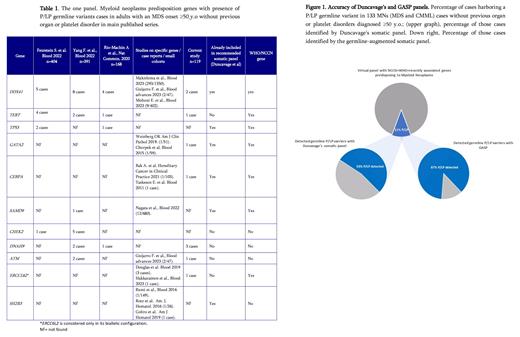Introduction
Patients aged 50 or older (≥50) with myeloid neoplasms (MNs), non-affected relatives, and no previous platelet or organ disorder are routinely not tested for germline predisposition. However, approximately 70% of myelodysplastic neoplasms (MDS) patients undergoing an allogeneic hematopoietic stem cell transplantation (alloHSCT) from familial donors, in 2021, were ≥50 years old (y.o.) (EBMT). Given the significant frequency of pathogenic/likely pathogenic (P/LP) germline variants in these patients (about 8%) along with the risk of transplanting cells with the same variant, it seems reasonable to perform universal germline testing in hematological neoplasms although challenging due to labor and cost constraints.
Aims
To address this, we developed a pragmatic approach incorporating a specific gene list to the diagnostic myeloid somatic panel to identify patients and exclude relatives with shared germline variants. To do that we: (1) Conducted a literature review to assess the gene-disease association's validity in this specific context. (2) Designed a germline-augmented virtual somatic panel (GASP) based on our findings. (3) Tested the virtual panel's performance in 133 MNs cases, aged ≥50, with matched germline-tumor exome sequencing, and no prior organ or platelet disorders.
Methods
We considered those genes included in the WHO Classification and NCCN Clinical Practice Guidelines as myeloid predisposition genes. For autosomal recessive disorders, heterozygous carriers were not considered. We analyzed the relation of these genes with MNs diagnosed ≥50 y.o. without prior organ or platelet dysfunction: To establish a valid association for a gene, we required the presence of P/LP variants in at least two peer-reviewed studies in the subset of interest. GASP combined genes with recurrent somatic mutations in myeloid disorders, as proposed by Duncavage et al. (Blood 2022), and those associated with the specific cohort of interest.
WES was performed on paired tumoral-germline samples on a HiSeq 2000/Novaseq6000 instrument (Illumina Inc) with a target of 100x depth coverage.
Results
From 2018 to 2023, we collected samples from 133 patients (121 MDS and 12 CMML cases -FAB myelodysplastic variant) diagnosed with WHO-established MDS, aged ≥50, without prior organ or platelet disorders. Among the main characteristics at baseline, we highlight a median age at diagnosis of 57 years old (range, 50-88), and the presence of a first-degree relative with a myeloid neoplasm diagnosis in 7% of the cases.
The literature search revealed 11 genes associated with germline predisposition within the cohort of interest. Seven were WHO/NCCN genes: DDX41, TERT, GATA2, CEBPA, SAMD9, ERCC6L2, and TP53. Additionally, four “recently associated genes” were incorporated based on recent descriptions in germline MNs ≥50 y.o. and reported at least in two peer-reviewed articles: CHEK2, DNAH9, ATM, and SH2B3 (Table 1).
Next, we tested the accuracy of both the GASP and Duncavage's recommended somatic panel in our cohort of 133 myeloid neoplasms characterized by WES. Among these cases, we identified 15 (11%) P/LP germline variants in both WHO/NCCN and recently associated genes. Duncavage's somatic panel could only detect 8 out of 15 (53%) cases, while the expanded GASP detected 13 out of 15 (87%) variants (Figure 1). The GASP showed a C-index of 0.933, outperforming Duncavage's panel, which scored 0.767.
Conclusions
Eleven genes have been found to harbor P/LP germline variants in patients with MNs diagnosed ≥50 y.o. and no previous organ or platelet disorder. In our cohort, 11% of patients carried a P/LP germline variant in a MNs predisposition gene. Such a finding would have gone undetected as germline predisposition testing is not typically advised for these patients. Expanding the myeloid somatic panel (GASP) allows the identification of 87% of P/LP variants during the diagnosis process, enabling clinicians to exclude carrier relatives as potential allo-SCT donors.
Disclosures
Bernal Del Castillo:AbbVie: Consultancy; Jazz: Consultancy; Otsuka: Consultancy. López-Andrade:Jazz Pharmaceuticals: Consultancy. Tazon:Bristol Myer Squibb: Honoraria. Diez-Campelo:Novartis: Consultancy, Honoraria, Membership on an entity's Board of Directors or advisory committees; Gilead Sciences: Other: Travel expense reimbursement; BMS/Celgene: Consultancy, Honoraria, Membership on an entity's Board of Directors or advisory committees, Other: Advisory board fees; GSK: Consultancy, Membership on an entity's Board of Directors or advisory committees. Bosch:Gilead: Consultancy, Honoraria; Janssen: Consultancy, Honoraria; AbbVie: Consultancy, Honoraria; Novartis: Consultancy, Honoraria; AstraZeneca: Consultancy, Honoraria; Takeda: Consultancy, Honoraria; Karyospharm: Other; Celgene: Consultancy, Honoraria; Roche: Consultancy, Honoraria; Mundipharma: Consultancy, Honoraria; Lilly: Consultancy; Roche: Honoraria; BeiGene: Consultancy. Jerez:Novartis: Consultancy; GILEAD: Research Funding; Astrazeneca: Research Funding; BMS: Consultancy.


This feature is available to Subscribers Only
Sign In or Create an Account Close Modal